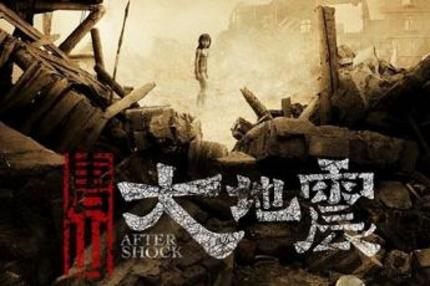AFTERSHOCK review

It's frustrating following Feng Xiaogang's transformation into the Chinese Steven Spielberg. This isn't innately a bad thing. He's still a talented director capable of doing astonishing things with moving images. It's just a huge disappointment seeing Aftershock come so close to being something extraordinary only to waste far too much of its potential on saccharine melodrama and nationalist chest-beating, with a climax which feels completely unearned.
Based on the Chinese-language novel of the same name, Aftershock was released to tie in with the relief efforts following the Sichuan earthquake in 2008. The film tells the story of a family in Tangshan, beginning more than three decades earlier, when the great earthquake of 1976 devastated that city, killing nearly a quarter of a million people.
The family become separated in the chaos following the quake, when a dreadful misunderstanding sees the mother, Li Yuan Ni (Xu Fan, One Foot Off the Ground, A World Without Thieves) giving her daughter up for dead. Rescued by the army, the daughter, Fang Deng is adopted but remains haunted by memories of the disaster, while the son Fang Da - now crippled - struggles to balance what he wants out of life with his mother's expectations of him as her only surviving child.
Feng is clearly out to make a piece of matinee entertainment aimed first and foremost at mainland domestic viewers, and in many respects he succeeds admirably. By Hollywood standards the budget was minute (around $22m) and much of the production design funded by donation drives, but the money was largely well spent.
The introduction is a slick, polished bit of sun-drenched nostalgia, lulling the viewer with childhood horseplay and idealised scenes of family life in a bygone decade. The quake itself, while not up to the breadth and scope of contemporary disaster porn, is still a hugely impressive set piece. Parts of the CG are overly showy and somewhat rough around the edges, but much of the destruction is physical effects work which comes across as terrifyingly realistic.
And 2012 this is not. While it's doubtful anyone could get away with glamorising Tangshan in front of a mainland audience, Feng still deserves plaudits for making the aftermath look like hell on earth. While it's not especially explicit, the images of shell-shocked survivors stumbling blankly through the wreckage are harrowing stuff.
While Aftershock never again becomes quite so gut-wrenching, the conviction from everyone involved lends even the most melodramatic passages a great deal of power. The terrible choice that sets up the rest of the film is obviously contrived, but it never feels entirely implausible, and the cast sell much of the psychic fallout from it admirably.
Zhang Jingchu (Beast Stalker, Protege, Jade Warrior) looks a little too old to play the teenage Fang Deng, but other than that it's a joy to see her in something where she's not wasted (after the pitiful The Double Life). Chen Daoming (Hero, Infernal Affairs III) is also exceptional as her adoptive father, particularly as an old man. The veteran actor conveys a great deal with body language and wordless gestures without ever turning his character into a cartoon.
But the problem with Aftershock is Feng insists on playing to the crowd almost from start to finish. Again, the propaganda elements in many mainland films aren't necessarily wholly bad, but here they slowly drag the film down, cheapening what should be something genuinely compassionate and humanist through the sheer volume of treacly schmaltz.
It starts with the scenes immediately after the quake, where the score feels horribly inappropriate for something so raw, and Feng keeps piling on the big moments until they start to lose their impact. Fang Deng's new family squabbles are not especially convincing, her subplot at university is well-intended but feels like a pale echo of Li Shaohong's masterpiece Stolen Life and Xu Fan as her mother begins to dial her reactions a little too high as the film drags on.
And the way Feng ties the story into the Sichuan earthquake is about as ham-fisted a mis-step as might be feared. Every last beat of the epilogue is hammered home with a crushing lack of subtlety when only the most oblivious viewer would fail to see the parallels with the opening.
Aftershock is a marked improvement on the over-rated Assembly, and it does contain some absolutely enthralling moments of populist cinema. But it returns to the well for naked appeals to Chinese nationalist pride one too many times to feel like anything more than an exercise in flag-waving at the expense of credible character development or lasting emotive power, and can only be cautiously recommended.











